Two weeks ago, before a trip to the distant Costa Rican territory of Isla del Coco, President Laura Chinchilla stood before the press at the Caldera Coast Guard base on the central Pacific and discussed her legacy in marine conservation.
“We can definitively say that we finished what we started,” Chinchilla said during her speech. “Thanks to the work of many different people we have moved forward with the political situation of our oceans.”
But though Chinchilla’s administration has pushed through a fair number of environmental policies during her time as president, conflicting interpretations among the different branches of government threaten to undermine the changes made in the last four years.
Environmental progress
Not everyone believes that President Chinchilla’s environmental management was as good as it could have been.
In 2012, Costa Rica’s most well-known environmental lawyer, Álvaro Sagot, critiqued the president for making environmental decisions politically rather than scientifically in Spanish-language newspaper El País. Others accused her of implementing changes too slowly.
Still, a number of changes greatly anticipated by the conservation community were made.
Since taking office, Chinchilla promised to complement Costa Rica’s world-renowned green agenda with a blue one for the nation’s seas. She created a Cabinet-level National Marine Commission and a Vice Ministry of Waters and Oceans, passed a blanket ban on shark finning and sent a bill to the legislature to reform the Costa Rican Fisheries Institute.
Beyond marine conservation, during Chinchilla’s tenure her environmental administration also declared the closing of two state-run zoos, which have long been criticized for their inhumane conditions.
These moves won her friends in the conservation community. Animal rights groups applauded the decision to close the public zoos. In 2011, she won the Peter Benchley Award for Excellence in Ocean Stewardship, followed by the Shark Guardian of the Year award in 2013 from the international shark conservation organization Sharkproject.
“This administration has done a lot for marine conservation,” said Randall Arauz, president of ocean conservation group Pretoma, during his speech at the Shark Guardian of the Year award presentation. “We want to see it go out on a high note.”
Judicial un-doing
Last month, an administrative court ruled that the country’s public zoos would remain open for another 10 years due to the Environment Ministry’s (MINAE) failure to notify zoo administration by the contractual deadline. Although MINAE has appealed the decision, for the incoming administration of President-elect Luis Guillermo Solís – who takes office May 8 – it seems all but certain the zoos will remain open.
“We supported that decision,” Patricia Madrigal, environmental spokeswoman for Solís’ party, the Citizen Action Party, told The Tico Times when asked about the zoo closures. “It’s unfortunate, but now it is in the hands of the courts.”
Then, just days before Chinchilla’s press conference in Caldera, a court in the Pacific fishing hub of Puntarenas acquitted a businesswoman for her boat’s haul of 652 shark fins. The judge’s verdict opens the door for legalized finning in Costa Rican waters.
In her speech, Chinchilla listed controlling shark finning among her legacies as president. She did not mention the court’s verdict. As the president headed out the door to catch her boat to Isla del Coco, The Tico Times asked her what she thought of the court’s decision.
“It bothers me a great deal,” she said. “We have advanced significantly in the measures we have passed through legislation. I believe we have advanced a great deal in policing these types of activities, but what we haven’t done is translate our efforts into the consciousness of our judicial system.”






